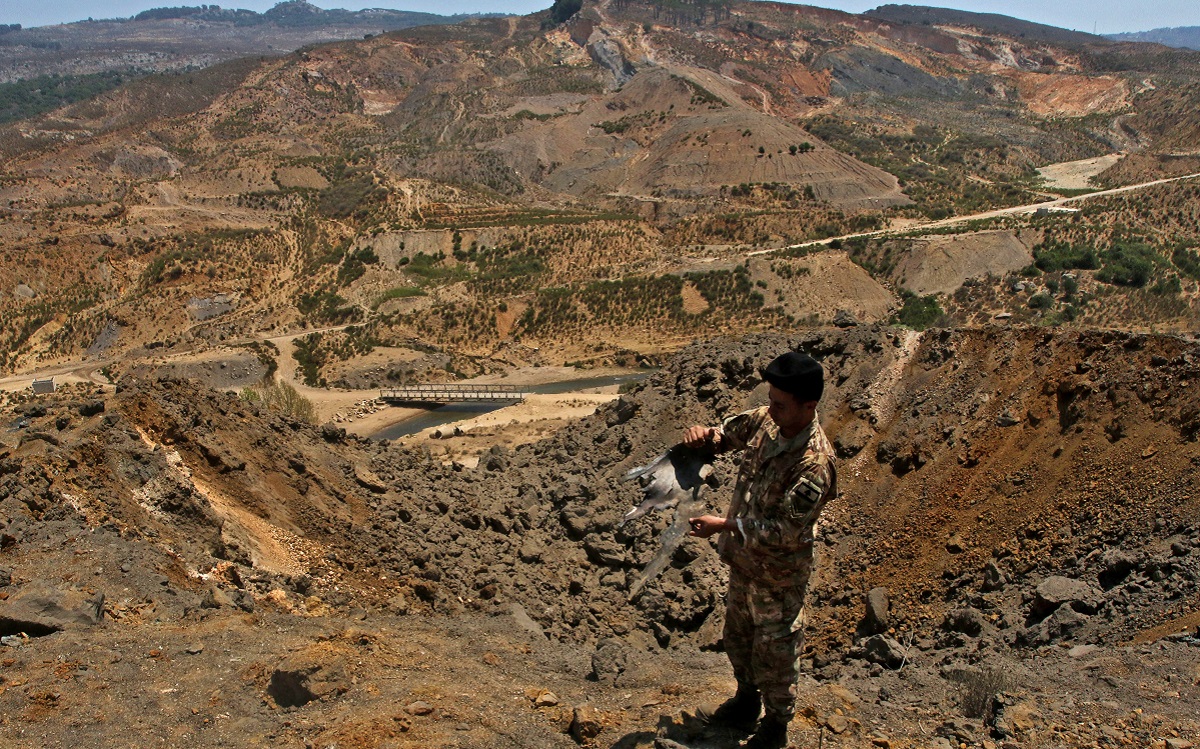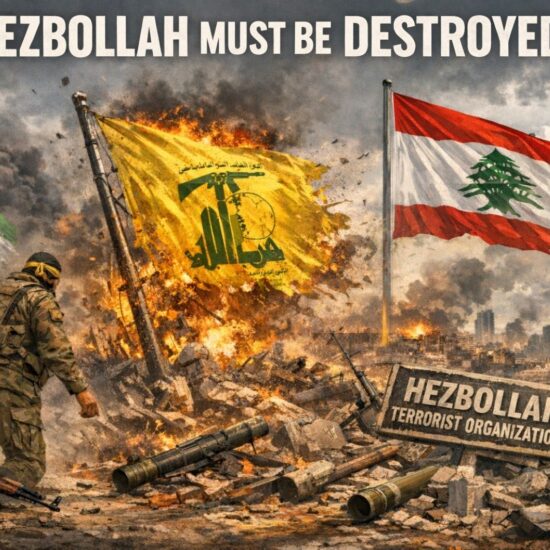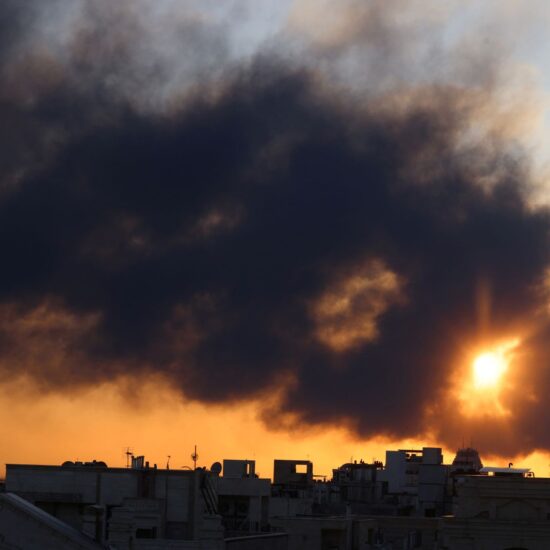
Militias create militias. That is a certainty, and that is what brought Lebanon to April 13, 1975, the moment the army disintegrated, and a multitude of armed groups drove the country’s fifteen-year civil war.
The threat of a return to heightened sectarianism and recurring violence is real. Thuggish attacks in Gemmayze earlier this month set off alarm bells, with harrowing videos shared of beatings and blood-drenched clothing between a faction of protestors and Lebanese Forces supporters.
But partisan attacks, as terrifying as they are, do not indicate a return to civil war.
Despite what feels at times like a rewind to the mid-1970s, the Lebanese Forces is not a militia. They operate in the same paralyzed political landscape as other parties. There is, however, one militia today – Hezbollah. And unlike the Lebanese army’s collapse in 1975, it remains unified today and – in principle – distant from local disputes. It also is both willing and able to confront armed opposition to the current status quo.
Hezbollah requires that entire situation for its own viability.
Contributing factors
Among key factors that brought the Lebanese state to its collapse in 1975 was the government’s inability to disarm non-state actors. The 1969 Cairo Agreement’s legitimization of Fatah in Lebanon, moving the PLO from Amman to Beirut and turning southern Lebanon into an open battlefield against Israel effectively denied the Lebanese army its sole armed authority. On the other side was the anti-PLO Kataeb paramilitary training that eventually brought two militias into armed confrontation.
Every single militia that later dominated headlines was born out of that breakdown. And with the Syrian army’s gradual occupation of Lebanon, the country turned into a battlefield for external regime influence.
Economic calamity, political paralysis and social explosion may describe the moment.
But not civil strife. Beirut hosts one militia, despite that group’s ‘resistance’ raison d’être having long expired. Describing Hezbollah as a militia is in itself an understatement – it is Iran’s most important military asset beyond its borders. And that mechanism has taken control over all of Lebanon’s sovereign decisions.
Domestic concerns
Lebanon’s foreign policy is an extension of those decisions, ranging from state-to-state relations with Iran that lack any diplomacy – Hezbollah serves as both Iran’s de facto ambassador to Lebanon and Lebanon’s unchosen representative to Iran (albeit in Lebanon); armed intervention among Hezbollah’s fighters entering Syria fighting to defend Bashar al Assad’s regime; and basic goods smuggled out of Lebanon to Syria today, to the detriment of Lebanon’s economy.
Threats to Hezbollah are dismantled. The ‘regime’, or whatever one calls Lebanon’s governing body today, covers Hezbollah’s tracks.
Within Lebanon, Hezbollah has maintained a foothold in institutions that shape internal security, including oversight into what enters and exits seaports and the airport. When one pro-Hezbollah airport official was fired in early May 2008 (and later reinstated), the group used their weapons against fellow Lebanese and within days took hold of Beirut. Their armed opponents had what amounts to small-scale weaponry, battling against Hezbollah’s sophisticated arsenal.
That armed challenge to Hezbollah’s position was decimated. Threats to Hezbollah are dismantled. The ‘regime’, or whatever one calls Lebanon’s governing body today, covers Hezbollah’s tracks.
In addition, domestic investigations into repeated attempted and successful assassinations that have been shelved. The sole individual identified with the Special Tribunal for Lebanon’s verdict in the assassination of former Prime Minister Rafik Hariri, Hezbollah operative Salim Ayyache, remains free. Furthermore, there is no push for an international investigation into all that is August 4, let alone recent condemnation by Hassan Nasrallah for what he considers a ‘politicized’ domestic probe into the port blast.
External support
Terms like sub-state actor or proxy militia downplay Hezbollah’s importance to Iran, itself possessing a veneer of theocratic governance, but in essence a military dictatorship.
Whether Iran is locally-led by Ahmadinejad, Rouhani, Raissi (or for that matter Khamenei), Tehran’s policy vis-à-vis its proxies has less to do with a persuasive Jawad Zarif or hawkish Hossein Amir-Abdollahian and more to do with the Islamic Revolutionary Guards Corps (IRGC).
And the IRGC’s external military matrix is headquartered in Lebanon.
Stability is not the goal, nor is direct occupation. There is a ‘one foot in, one foot out’ assurance that, despite heightened criticism, widely exempts Hezbollah from government failure and shields them from local responsibilities.
From a financial crisis hitting all sectors of Lebanese society to corruption, plundering and outright thievery, Hezbollah (for the most part) remains out of the fray. The resentment turned rage against failing institutions, rapid inflation, and crippling consequences of power outages and fuel and medicine shortages are focused on a ‘political class’, instead.
The nominally anti-Hezbollah politicians that are still alive and retain any leverage in Lebanon’s government are indirect enablers of the status quo, ensuring a recurring ‘national unity’ that paralyzes the state.
There is a ‘one foot in, one foot out’ assurance that, despite heightened criticism, widely exempts Hezbollah from government failure and shields them from local responsibilities.
Paralysis, however, does not suggest collapse. Hezbollah exists to benefit from the Lebanese state, not to destroy it.
And the system it has preserved continues. That is how the Syrian regime governed Lebanon for fifteen years, an arrangement Hezbollah inherited and is holding together.
Yet heightened resentment towards that group is real, and despite Hezbollah’s efforts to dominate Lebanon’s security landscape, they cannot contain all threats.
Khalde
An ambush by Sunni Arab tribes against Shia mourners in Khaldeh on August 1, a day following what was described as a revenge killing of a Hezbollah member, offers a precursor to what could spiral out of control. Three hours of armed clashes led to three mourners killed and multiple wounded. The Lebanese army immediately intervened, with Hezbollah demanding the government hold criminals to account (itself an irony). But that irony, if you will, is the arrangement Hezbollah depends on when it is on violence’s receiving end. The state chases down Hezbollah’s opponents for good reason – competing militia may prove fatal to Hezbollah, a situation they cannot manage or necessarily win. Battling armed opponents would distract and even destroy what Iran has built up over the past four decades – a military base legitimized by the Lebanese state.
Hasbaya
The day following the port blast anniversary, border battles between Hezbollah and Israel resulted in the first Israeli air strikes against Lebanon in fifteen years following the end of the July 2006 war. Two Hezbollah militiamen returning from firing rockets into the Shebaa Farms were stopped by local villagers from nearby Hasbaya, angered at potentially placing their village in the battlefield’s crossfire. A rare occurrence of outright objection towards Hezbollah’s armed presence. A launchpad was seized and two members were ‘arrested’ and handed over to the Lebanese army. Rather than acknowledge the villagers’ ability to curtail Hezbollah’s activities in the south, Walid Jumblatt chided their decision, warned of unnecessary confrontation and made assurances this would not happen again. The Lebanese army subsequently returned the launchpad to Hezbollah and freed the two men.
The timing of the recent battles with Israel – coinciding with increased accusations of indirect involvement with the port’s ammonium nitrate storage dump – and the decision to avoid further escalation by lobbing rockets into empty patches of the Shebaa Farms portray Hezbollah as less a Lebanese militia concerned over local popularity and more an Iranian force engaged in perpetual war.
(Re)cover
Walid Jumblatt paid a political price for pushing for the arrest of an airport official closely affiliated with Hezbollah in May 2008, and despite his condemnation of the Assad regime he has been measured in his recent criticism towards Hezbollah. A position mirroring that of former prime minister Saad Hariri, offering rhetoric without any steps taken to challenge Hezbollah’s position.
Political cover from popular political figures representing Lebanon’s larger religious communities, including Michel Aoun and Nabih Berri, is paramount to the legitimization Hezbollah dictates. Along with avoiding army disintegration or any competing militia repetition from what happened in the early 1970s.
While the precursors to chaos and violence are available in any perpetual battlefield, Iran’s army in Lebanon prevents absolute anarchy, total state collapse and renewed civil war from happening.
Hyperinflation, economic freefall and political stagnation contributed to the erosion of Lebanese society well into the 1980s. Those are the comparisons that resonate. But the security conditions created today by Hezbollah are vastly different, and the geography we live in is not a multifaceted but one-sided warzone.
The Syrian-era system survives, preserving Iran’s interests. For the state to one day reform, restoring Lebanon’s sovereignty is paramount.
And while the precursors to chaos and violence are available in any perpetual battlefield, Iran’s army in Lebanon prevents absolute anarchy, total state collapse and renewed civil war from happening.
Ronnie Chatah hosts The Beirut Banyan podcast, a series of storytelling episodes and long-form conversations that reflect on all that is modern Lebanese history. He also leads the WalkBeirut tour, a four-hour narration of Beirut’s rich and troubled past. He is on Facebook, Instagram, and Twitter @thebeirutbanyan.
The opinions expressed are those of the author only and do not necessarily reflect the views of NOW.







